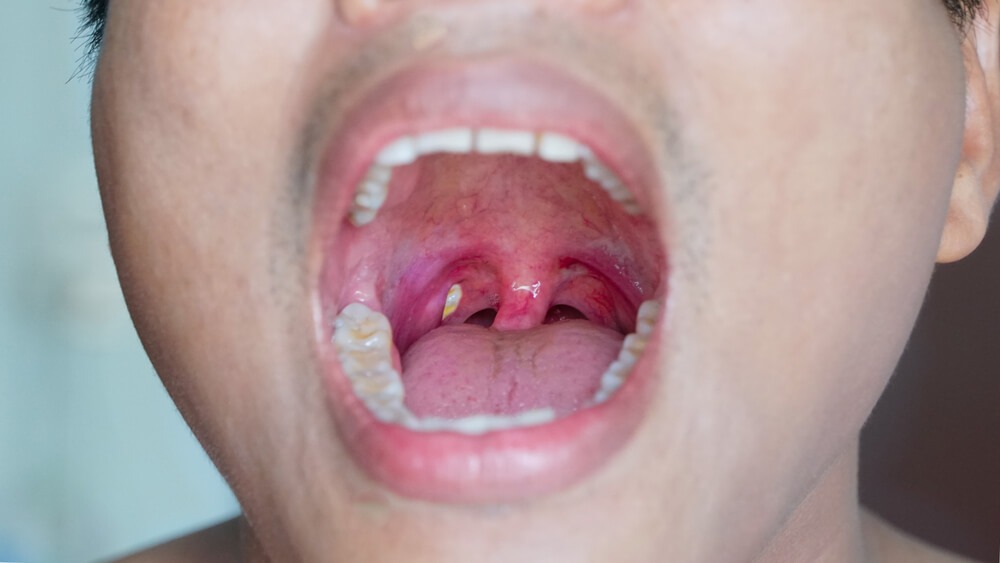Have you ever wondered why there are holes in your tonsils? And could vaping be the culprit behind those annoying tonsil stones? In this article, we will explore the connection between vaping and tonsil stones, uncovering whether vaping can indeed cause these pesky formations.
Table of Contents
What Are Tonsil Stones?
Tonsil stones, also known as tonsilloliths, are small calcified formations that can develop in the crevices of your tonsils. These formations are made up of a combination of debris, bacteria, and dead cells that get trapped in the tonsil crypts, the natural pockets and crevices present in the tonsils.
1. Appearance and Texture
Tonsil stones can vary in size and appearance. They are typically yellowish or white in color and have a soft, cheese-like texture. However, they can also be hard and rough in some cases.
2. Causes of Tonsil Stones
Tonsil stones form when debris, bacteria, and dead cells accumulate in the tonsil crypts. Several factors can contribute to the development of tonsil stones:
- Poor oral hygiene: Inadequate brushing and flossing can allow debris and bacteria to accumulate in the mouth, increasing the risk of tonsil stone formation.
- Dry mouth: Lack of saliva production can lead to dry mouth, which creates an ideal environment for the accumulation of debris in the tonsils.
- Chronic tonsillitis: Recurrent or chronic inflammation of the tonsils can promote the formation of tonsil stones.
- Post-nasal drip: Excess mucus from the nose and sinuses can flow down the back of the throat, contributing to the accumulation of debris in the tonsils.
Must See: How I Healed My Receding Gums Naturally: A Comprehensive Guide
The Relationship Between Tonsil Stones and Vaping
Vaping, the act of inhaling and exhaling vapor produced by an electronic cigarette or similar device, has become increasingly popular, especially among young adults. However, there is growing concern about the potential impact of vaping on oral health, including its connection to tonsil stones.
E-cigarettes consist of various components, including nicotine, propylene glycol, and flavorings. When you vape, the heat from the device can cause the chemicals to dry out your mouth. This dryness can interfere with the natural cleansing process of your tonsils, which relies on saliva to flush out debris and bacteria.
Furthermore, nicotine and certain chemicals in e-cigarettes can reduce saliva production, exacerbating the problem. Without sufficient saliva, debris and bacteria are more likely to accumulate in the tonsil crypts, leading to the formation of tonsil stones.
Understanding the Mechanism
To understand how vaping can contribute to tonsil stone formation, it's important to know a bit about the anatomy of the tonsils. Tonsils are two almond-shaped glands located at the back of your throat. They contain small crevices called crypts, which can trap debris and bacteria.
Under normal circumstances, saliva helps to flush out these crypts and maintain the cleanliness of the tonsils. However, vaping can disrupt this natural cleansing process by reducing saliva production and causing dry mouth. As a result, debris and bacteria have a higher chance of accumulating and forming tonsil stones.
Common Symptoms and Complications
Tonsil stones can cause a range of symptoms, which can vary depending on the size and location of the formations. Some common symptoms associated with tonsil stones include:
- Bad breath: Tonsil stones often emit an unpleasant odor, leading to persistent bad breath.
- Sore throat: The presence of tonsil stones can irritate the throat and cause discomfort.
- Difficulty swallowing: Larger tonsil stones can make swallowing challenging and create a sensation of something stuck in the throat.
- Ear pain: Tonsil stones can sometimes cause referred pain to the ears.
- Metallic taste in the mouth: Some individuals with tonsil stones may experience a metallic taste due to the presence of bacteria and debris.
- Coughing: Tonsil stones can trigger a persistent cough, especially if they are dislodged and irritate the throat.
- Tonsil swelling: Inflammation of the tonsils can occur as a result of the presence of tonsil stones.
- White or yellowish spots on the tonsils: Tonsil stones can be visually observed as white or yellowish spots on the surface of the tonsils.
- Chronic post-nasal drip: Tonsil stones can contribute to excessive mucus production, leading to a constant feeling of mucus in the back of the throat.
- Metallic or sour taste upon coughing up a tonsil stone: In some cases, when a tonsil stone is coughed up or removed, it may leave a metallic or sour taste in the mouth.
In addition to these symptoms, tonsil stones can also lead to complications such as recurrent tonsillitis (inflammation of the tonsils), chronic inflammation of the tonsils, and the formation of abscesses in the tonsils. It's important to seek medical attention if you experience severe or persistent symptoms associated with tonsil stones.
Also Read: 20 Home Remedies for Abscess Tooth – Get Quick Relief
Prevention and Treatment
If you're concerned about tonsil stones or want to prevent their formation, there are several measures you can take:
- Practice good oral hygiene: Regularly brushing your teeth, flossing, and using mouthwash can help reduce the build-up of debris and bacteria in your mouth.
- Stay hydrated: Drinking plenty of water can help maintain saliva production and prevent dry mouth, which can contribute to tonsil stone formation.
- Avoid smoking and vaping: Both smoking and vaping can contribute to dry mouth and increase the risk of tonsil stone formation. Quitting or reducing your usage can help prevent them.
- Limit alcohol consumption: Alcohol can cause dehydration and decrease saliva flow, making it easier for tonsil stones to form. Moderation is key.
- Avoid dairy products before bed: Dairy products can increase mucus production, which can contribute to the formation of tonsil stones. If you notice a correlation, try avoiding them before bedtime.
- Maintain a healthy diet: Eating a balanced diet rich in fruits and vegetables provides essential nutrients that can support overall oral health and reduce the risk of tonsil stones.
- Use a tongue scraper: Regularly cleaning your tongue with a tongue scraper can help remove bacteria and debris that could contribute to tonsil stone formation.
- Consider probiotics: Probiotic supplements or foods like yogurt can help maintain a healthy balance of bacteria in your mouth, reducing the risk of tonsil stones.
- Use a humidifier: If you live in a dry environment, using a humidifier can add moisture to the air and prevent your mouth from becoming too dry.
- Seek professional cleaning: Regular dental cleanings can remove plaque and tartar buildup, reducing the chances of bacterial accumulation in the tonsils.
Remember, prevention is key when it comes to tonsil stones. By adopting these preventive measures and maintaining good oral hygiene practices, you can minimize your risk of developing tonsil stones and the discomfort they can cause.
However, if you do experience the formation of tonsil stones or persistent symptoms, it's important to consult a healthcare professional. They can provide a proper diagnosis, offer personalized advice, and suggest appropriate treatment options based on the severity of your condition.
Conclusion
In conclusion, there appears to be a connection between vaping and tonsil stone formation. The chemicals in e-cigarettes, combined with the dryness caused by vaping, can disrupt the natural cleansing process of the tonsils, leading to the accumulation of debris and the formation of tonsil stones.
As vaping continues to gain popularity, it's important to be aware of its potential impact on oral health. By taking preventative measures, such as practicing good oral hygiene, staying hydrated, and avoiding smoking and vaping, you can reduce the risk of developing tonsil stones.
However, if you are already experiencing symptoms or are concerned about tonsil stones, it's best to seek professional advice. A healthcare professional will be able to provide a proper diagnosis and guide you towards the most appropriate treatment options for your specific situation.
FAQs about Tonsil Stones and Vaping
1. Can vaping cause tonsil stones?
While there is no direct evidence linking vaping to tonsil stones, some studies suggest that vaping can contribute to dry mouth and reduce saliva production. Dry mouth is a risk factor for tonsil stone formation. Therefore, it is possible that vaping could indirectly increase the likelihood of tonsil stone development.
2. What are tonsil stones made of?
Tonsil stones are made up of a combination of debris, bacteria, and dead cells that accumulate in the crevices of the tonsils. The debris can include food particles, mucus, and saliva, which become trapped and calcify over time, forming small stone-like structures.
3. Are tonsil stones contagious?
No, tonsil stones are not contagious. They are formed within the individual's own tonsils and are not transmitted from person to person. However, the bacteria present in tonsil stones can contribute to bad breath, so it's essential to practice good oral hygiene to minimize any unpleasant odor.
4. Can tonsil stones be prevented?
While it may not be possible to completely prevent tonsil stones, there are steps you can take to reduce their formation. Maintaining good oral hygiene by brushing your teeth, flossing, and using mouthwash regularly can help prevent the build-up of debris and bacteria. Staying hydrated and avoiding smoking or vaping can also help reduce the risk of tonsil stone development.
5. Can tonsil stones be removed at home?
It is generally not recommended to try removing tonsil stones at home, as this can lead to injury or infection. If you suspect you have tonsil stones or are experiencing persistent symptoms, it is advisable to consult a healthcare professional. They can provide proper diagnosis and recommend appropriate treatment options, which may include professional removal or other interventions if necessary.
Also Read: Can a Tooth Cavity Kill You? Exploring the Dangers of Untreated Cavities


